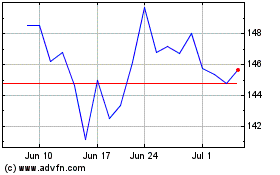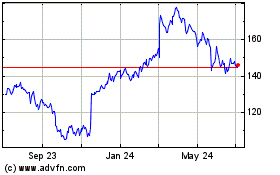Coronavirus Boosts Target's Sales but Squeezes Profits
March 25 2020 - 7:05AM
Dow Jones News
By Sarah Nassauer
Target Corp. said sales of food and household goods are surging
because of the coronavirus pandemic, but the retailer may report
lower-than-expected profits as demand falls for high-margin goods
such as apparel and it becomes more expensive to staff and clean
stores.
Comparable sales, those from stores and digital channels
operating for at least 12 months, are up more than 20% thus far in
March compared with the same period last year. Sales of household
essentials, food and beverages have risen more than 50% during that
time, while sales of apparel and accessories have declined more
than 20%.
Target, Walmart Inc., Amazon.com Inc. and other retailers
selling groceries and cleaning products have struggled to restock
stores and handle the surge as people race to stock up as the virus
spreads. Walmart and Amazon have announced plans to hire 250,000
temporary workers.
As schools around the country close and many people work from
home, sales of home-office supplies and children's entertainment
items have risen, but "higher-margin discretionary categories
declined dramatically, " Target Chief Executive Brian Cornell said
on a call with reporters. If that trend continues, gross profit
margin will be lower than expected for the current quarter, he
said.
Target is also spending more than expected on worker pay and
benefits because of the spike in product volume moving through its
supply chain and the need for more-rigorous cleaning routines, the
company said. The company expects those changes to cost more than
$300 million during the current quarter.
Target withdrew financial guidance for the quarter and full year
and will suspend share repurchases, the company said.
Previously, Target said adjusted earnings per share for the
current quarter would hit $1.55 to $1.75 per share, and $6.70 to
$7.00 per share for the full year.
Shopper behavior and economic pressures are fluid and
unpredictable, said Mr. Cornell. Target is surveying shoppers to
gauge how the new-coronavirus pandemic may affect behavior longer
term, he said.
"Usually a recession is something that builds gradually over a
period of time. This has happened virtually overnight," said Mr.
Cornell. "It's safe to say sitting here today that America is
largely closed for business."
Dozens of retailers from Macy's Inc. to Dick's Sporting Goods
Inc. have closed thousands of stores as the number of U.S.
infections increased and health officials advised people to limit
travel. The number of coronavirus cases in the U.S. exceeds more
than 50,000, according to Johns Hopkins University.
Executives at Nike Inc., which closed its U.S. stores March 16,
said online sales in the U.S. have surged for the sportswear brand
in recent days.
Retailers staying open to sell food, cleaning supplies and other
essential goods have made a number of changes, offering more paid
leave to encourage sick workers to stay home, boosting hourly pay,
instituting senior-citizens-only hours and doing more-frequent
cleaning.
Target said Wednesday that it will beef up those efforts,
cleaning self-checkout areas after each shopper and placing signs
on the floor and other areas to remind shoppers to stay apart from
each other. Starting Thursday, Target will also temporarily stop
accepting returns and won't sell reusable bags or let store workers
load shoppers' reusable bags, Mr. Cornell said.
Walmart said Tuesday that it will add sneeze guards to checkout
areas in the coming weeks to protect cashiers, spray down carts
with sanitizing chemicals and place floor decals near entrances and
registers, "making it easier for customers to judge the proper
social distance from each other."
Target will also pull back on its previous plans to remodel
around 300 stores this year, instead completing the 130 already
under way and putting off the rest until next year. The retailer
plans to open 15 to 20 new small-format stores this year instead of
the 36 previously planned, moving those projects to next year.
"We are prioritizing the work that's in front of us to support
our team, store operations and supply chain," said Mr. Cornell.
Write to Sarah Nassauer at sarah.nassauer@wsj.com
(END) Dow Jones Newswires
March 25, 2020 06:50 ET (10:50 GMT)
Copyright (c) 2020 Dow Jones & Company, Inc.
Target (NYSE:TGT)
Historical Stock Chart
From Mar 2024 to Apr 2024

Target (NYSE:TGT)
Historical Stock Chart
From Apr 2023 to Apr 2024
